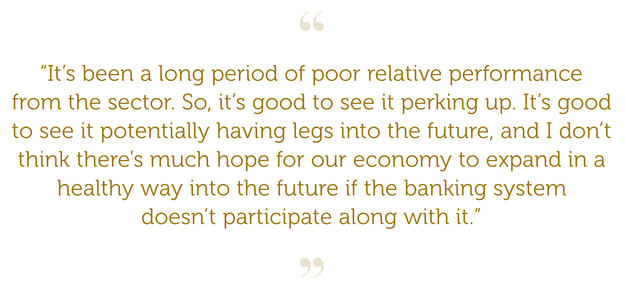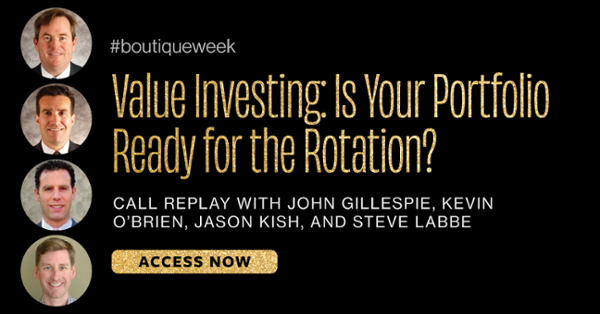On May 25, Prospector Portfolio Managers John Gillespie, Kevin O’Brien (CFA), Jason Kish (CPA, CFA) and Steve Labbe (CFA) recently conducted a video conference call with Stacy Havener, Founder & CEO of Havener Capital Partners, in which they shared their views on markets, inflation and value investing, among other relevant topics.

As part of the discussion, the portfolio managers shared their outlook for banks and insurance companies, two key areas of focus for the firm. Excerpts from the conversation follow:
Steve Labbe: 2020 was not kind to insurance stocks, whether we're talking about life insurance companies or property casualty insurance companies. Life insurance companies had to deal with the sudden and very severe drop in interest rates. That was a major headwind as well as the spike in mortality experience. It was the largest spike in mortality experience I've seen in my career. Not that there were a ton of life insurance companies back in 1918, but I'm sure you had to go back to some other epidemic to see a spike similar to the one the industry just experienced.
On the property casualty insurance side, it was a record year for hurricane catastrophes and other catastrophe losses. There was also a great deal of concern about the impact of COVID on the claims experience, particularly around some creative, legal interpretations of coverages known as business interruption. These issues made insurance company stocks really bad stocks last year.
Fortunately, year to date, we've seen some bounce back in those groups. On the life insurance side, it is expected that, hopefully, that we've seen the worst in mortality. Some of the interest rate pressure has also been alleviated. We hope more is to come, but some has been alleviated, so that combination has represented a nice tailwind for the life insurance group this year.
On the property and casualty side, the extreme tail risk concerns of what COVID might do for the claims experience has alleviated a bit and people are less nervous about the ultimate outcome because most of the legal interpretations have gone the way the industry has suggested it should. Now investors can focus on the earnings recovery element of the businesses. The property casualty insurance industry is cyclical - not cyclical in the sense of general economic cyclicality - but cyclical in that it's a business where you don't know your cost of goods sold until well after you've sold the product, so it creates cycles. And we are now in that earnings period of that cycle, where these companies are recognizing the margin improvement and the earnings improvements embedded in their portfolios from having raised rates for three years. It was hard [for the market] to focus on that during COVID, but now investors are focused on the true underlying improvement in the businesses, and there's still some very reasonably priced property-casualty insurance companies with more of the earnings recovery to take place.
Stacy also asked Kevin for his outlook on the banking industry:
Kevin O'Brien: It's worth noting, banks have been pretty strong performers, but for context, most of the names in our portfolio are still trading at low double digit PEs and very reasonable price to tangible book value multiples. They're in the middle of the range of where those valuations have been historically. So, the question might be, are they still interesting? I would answer it this way … the first phase of banks’ performance has been driven by credit, and then a little bit by interest rates. What you have not gotten is growth. The next question is, why haven't banks had growth? The reason is that when you give everybody a ton of free money, things like PPP loans, all those balances are in the process of being forgiven. A lot of them have been. It's going to take a little while for people to put that money to work.
Our belief is that over the next couple of quarters, people are going to start to put that money to work through capital expenditures. They're going to draw down on some of those [credit lines], and in the future, give it two to three quarters, you're going to see loan growth really start to accelerate because we think the economy is going to accelerate, and we're also going to get higher interest rates. While the PEs and price to tangible book multiples are pretty reasonable compared to history, net interest margins are dramatically lower than where they've been in prior cycles. And if we can breathe a little bit of a life into the longer part of the curve in the form of higher interest rates, you could really see those margins pick up.
John added his thoughts as well:
John Gillespie: I would say it's about time. It's been a long period of poor relative performance from the sector. So, it's good to see it perking up. It's good to see it potentially having legs into the future, and I don't think there's much hope for our economy to expand in a healthy way into the future if the banking system doesn't participate along with it. So, we're staying pretty constructive.
Interested in hearing more on topics related to the new economic cycle, value investing or where we are seeing opportunities? Check out the full video call with the portfolio managers titled Value Investing: Is Your Portfolio Ready for the Rotation? Click on the graphic below to get started.


